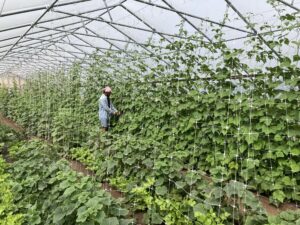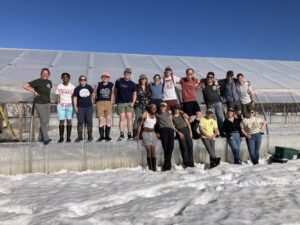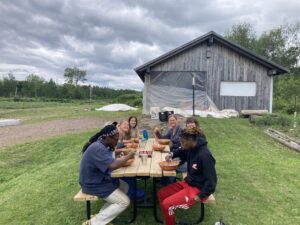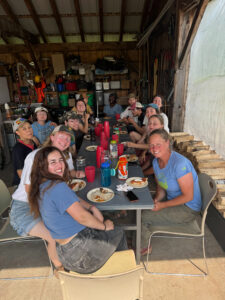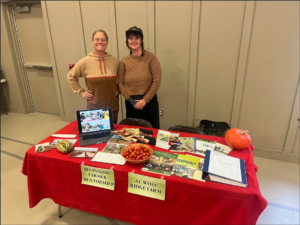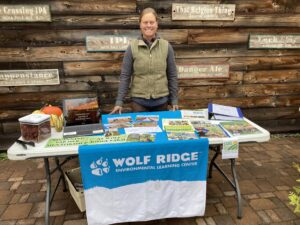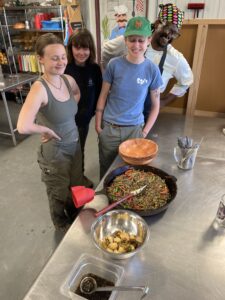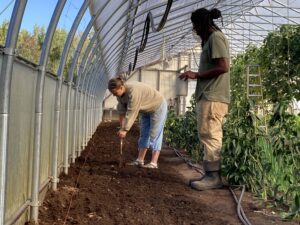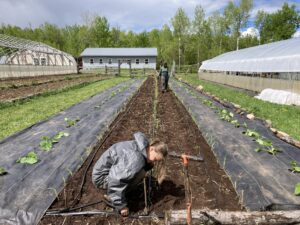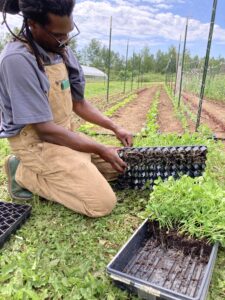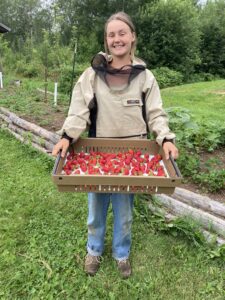Final report for FNC23-1398
Project Information
Lucy Carlson: Lucy is a beginning farmer, currently growing a small, ¼ acre market garden that produces vegetables and cut flowers in Cook County, Minnesota. She recently acquired a 2-acre parcel which she plans to put in production in the summer of 2024. She is a recent graduate of the University of Minnesota with a degree in Food Systems, focusing on organic and local food production. Lucy has worked in cold-hardy vineyard management, soil agroecology research and home vegetable production for 5+ years to develop her knowledge of sustainable agriculture and local food systems. As an emerging farmer, Lucy sees the value that training can provide when starting a farm business, which is her motivation for working with Sarah on this project.
Sarah Mayer: Sarah Mayer, manager of Wolf Ridge Farm at Wolf Ridge Environmental Learning Center(ELC), has been educating others in nature and in food production for nearly 15 years. Naturalists, volunteers, interns, and WWOOFers(World-Wide Opportunities on Organic Farms) receive extensive mentoring and education from Sarah each season. They take skills, concepts, and inspiration from Wolf Ridge and carry them on to farming communities throughout the country. Sarah finds that networking with other farmers and farm educators to be the key to effective outreach and education. Sarah fosters the necessary relationships formed and built upon among Farm Crew, cafeteria chefs, classroom teachers, students, naturalists, neighboring farms, universities, and community members to drive Wolf Ridge Farm to grow and thrive. Sarah leans on and contributes to a myriad of agricultural and farm-based education networks and organizations to achieve a balance of producing food, teaching about food, and making that food accessible.
Since the first growing season in 2013, Wolf Ridge Farm has blossomed into a facility that includes three high tunnels, a pack shed with a certified kitchen, and a timber framed seasonal classroom with a wood-fired oven. The total farm area includes 6 ½ acres: ½ acre in vegetable production, 1 acre in cover crop, and 1 acre transitioning from aspen, alder, and other forest understory regrowth to cover crop, with the remaining acreage in forest.
Wolf Ridge Farm has developed new enterprises due to pandemic shifts including CSA, Farmer's Market, community co-op sales, community farm-side wood-fired pizza pick up, Farm to School, and Farm to Food Shelf. The farm will continue to supply produce to the ELC’s kitchen.
Northeast Minnesota has a low density of farms providing food to consumers, yet there is a high demand for local, sustainably produced food in our area. Farmer’s market attendees in Finland, Two Harbors, Aurora, Hibbing, Tower, and Ely are asking for more produce options and a longer market season. Farm to School funds are available from schools in Aurora, Tower, Ely, and Hibbing without the local production to match those funds. The staff and volunteers at Ely Food Shelf continue to bring in whatever local produce they can find, but still look to meet their shoppers’ needs beyond the growing season with storage crops. These examples highlight the need for more farmers in the region.
Former WWOOFers(World Wide Opportunities on Organic Farms) and Interns at Wolf Ridge Farm don’t have paid training opportunities beyond their first market farming experience. An apprenticeship program would allow them to build on farming skills and business savvy while developing relationships with already established local markets.
Many community members have expressed interest in establishing food hubs with storage facilities, producer cooperatives, robust farm to school programs, and farm to food shelf programs. The lack of local farmers inhibits these projects before they begin.
To build a sustainable food system, we will address the need for more producers by designing and piloting a paid, regenerative farming apprenticeship at Wolf Ridge Environmental Learning Center. The expected outcome of the program is an increase in the number of local farmers, an increase in the amount of food produced and sold locally, and an increase in knowledge of farm business planning and marketing among established and emerging farmers in the region. To meet these outcomes, we will use a 4-phase approach that will result in a completed curriculum, a pilot apprenticeship program, farm technical assistance for the local community of producers and participating apprentices, and plan to fund the program beyond the life of this grant. The following describes our objectives and the associated approach of each:
Objective 1:
- To meet this objective, we will partner with local organizations with experience in farmer training to develop a holistic sustainable farm management program. We plan to partner with the Northeast Regional Sustainable Development partnership, The Food Group, Friends of the Finland Community, and The University of Minnesota’s Farm at the Arb. Two of these organizations already operate farm apprenticeship programs in southern Minnesota, so we will draw from their experiences to develop a program that suits the unique climatic, soil, and market challenges of Northeast MN. After we design the program, there will be an outreach event where the program is presented and the community will have the opportunity to provide feedback.
Objective 2:
- We will achieve this goal by combining hands-on learning, print resources and mentorship to educate apprentices. Apprentices will work on the farm four days a week, working alongside Sarah to learn about all aspects of farming. The cohort will also visit other local farms to gather perspectives on the many ways to farm sustainably in the region.
Objective 3:
- We want to ensure that this training serves not only the folks participating in the program, but also the established but underserved producers of our region. To accomplish this goal, we will record 3 hands-on lectures given to the apprentices, each in the respective areas of business planning, marketing, and sustainable management. These workshops will be available to any farmer in-person, but will also be recorded and stored on the Finland Food Chain/Wolf Ridge website for accessibility. We will also build a list of resources, gathered from existing programs with permission, that farmers can easily access through these respective websites.
Objective 4:
- We will identify donors, grants and tax levies that could support the program beyond the life of the grant. Our farmer team will lean on Friends of Finland, a community non-profit with years of fundraising and donor relationship experience, to build a funding plan that will sustain the program for future years. This will ensure that the program can have a lasting economic and social impact.
OBJECTIVES
- Develop a paid apprenticeship program that trains emerging farmers in all aspects of sustainable farm management.
- Train 2 emerging farmers and support 3 existing farmers in farm business planning, regenerative management and farm marketing through integrative workshops.
- Develop a database of farm technical assistance that can be used by apprentices and local farmers during and beyond the life of the grant program.
- Identify and secure 3 funding sources that will sustain the job training for future years.
Cooperators
- - Producer
- - Producer
Research
During Year 1, the research and development phase, the following qualifying questions were asked to determine methods of program implementation for Year 2:
- What vegetable grower apprenticeships currently exist and what resources can we pull from them?
- How many apprentices do we have capacity for?
- When will the on the job training(OJT) portion of the program start and end? How many hours per week will they receive on the job training?
- When will the coursework portion of the program start and end? How many hours per week will we dedicate to class time? Do mentors have hours to dedicate to coursework before and after the on the job training portion?
- How do we determine apprentices' compensation?
- Do we need a higher educational partner, i.e., a degree seeking program provided by a college/university?
- The biggest reason we explored this question was to secure future funding for "tuition" for a classroom portion of the apprenticeship program. Grant applications are available each spring for approximately $2 Million in Dual Training Grant funds from the Minnesota Department of Labor and Industry and Department of Higher Education. $6000/year per trainee includes tuition, fees, required books and required materials
- We also explored this question because we wanted a structured classroom portion of the program to support on the job training.
- Would an on-line market gardening curriculum like the Neversink Market Farming Course and the Market Gardener Institute Masterclass be a better fit for our pilot program due to our geographically remote location and the desire for a vegetable growing specific focus? How will we fund this?
- Can we use local experts in vegetable production as laboratory supplements to our on the job training and coursework portion of the program?
- How will we recruit apprentices? What qualifications will we look for?
- How will we gather feedback from apprentices?
- What sources of future funding could sustain the program?
Results of Year 1 Research:
- The following vegetable grower apprenticeship models and farmer training resources were highlighted in our research:
- University of Minnesota Landscape Arboretum's Farm at the Arb Apprenticeship - Structure = 450 classroom hours, up to 725 paid hours; we decided on 700 paid hours but are currently undecided on what classroom hours will be included in the paid hours. We do not currently have the mentorship capacity for 450 classroom hours but could offer an at-your-own-pace pre- or post- OJT (On the job training) option with an on-line market farming course. We are seeking other funding opportunities so that mentors could be paid for more classroom facilitation.
- New Entry Sustainable Farming Project - Just one of their programs, New Entry's Farm Business Planning Course is designed to help beginning farmers write their business plan. It's an 8 week course in October and November. We are currently seeking funding for this course for our mentors and apprentices.
- Caretaker Farm - They have a dedicated page on their website of the details of their Apprenticeship program. This could be a great addition to the Wolf Ridge website if we have the capacity for a second season of apprenticeships.
- Another non-profit farm, Zenger Farm, highlights current and former apprentices and their stories on their website. Program goals and applications are laid out clearly as well. These could also be a great addition to the Wolf Ridge website.
- FairShare CSA Coalition - The first registered apprenticeship for organic vegetable production in the US, the program offers an hourly wage during OJT and 144 hours of compensated classroom instruction. Apprentices complete 3 structured courses through the Wisconsin Technical College System.
- Land Stewardship Project Farm Beginnings - 12-month training session that helps beginning farmers clarify their goals and strengths, establish a strong enterprise plan, and start building their operation. The course uses a mix of farmer-led classroom sessions, on-farm tours, and an extensive farmer network. Farm Beginnings focuses on the business management skills of farming. This may be appropriate for a second year apprenticeship. This may be most suitable for a second year apprenticeship.
- The University of Minnesota's Wholesale Readiness Training is a free, recorded webinar style series with supporting documents to prepare interested farmers to sell in wholesale markets. Modules include business planning, food safety, farm financial management and nutrient management. Certain modules such as food safety and nutrient management could work well for the pilot apprenticeship.
- The awarded SARE funds were designed to support two paid apprenticeships as indicated in the proposal's budget. At the end of Year 1, we have decided that two apprentices would be the best fit for the pilot season, based on available funding and available mentors.
- We decided on a 20 week on the job training portion (OJT) in order to encompass the majority of the growing season. Apprentices will have 35 hours per week of OJT. Our goal is to offer 10% classroom time, 80% OJT, 5% farm visits, and 5% laboratory sessions with community farmer instructors.
- With the flexibility of an at-your-own-pace market farming course, we will practice crop specific growing techniques in conjunction with the MGI Masterclass's tutorials on specific crops. Mentors may or may not be present for these tutorials. Apprentices could theoretically view them on their own time during a particular week.
- Apprenticeship programs vary widely in compensation. We figured a wage of $15/hr during the 20 weeks of on the job training, based on a living wage in Lake County of $15.51/hr for one adult working full time. We'd like to either increase wages or offer free room and board as funding allows. In the meantime, we feel that we are offering an average compensation package for this pilot season.
- The MDA Dual Training Grant's necessity to partner with an institution that offers a degree seeking program is currently a barrier for our apprenticeship at Wolf Ridge. Central Lakes College's Specialty Crops program seemed to be our only option remotely close to the Arrowhead Region focusing on vegetable production as a career path. They offer a combination of zoom sessions and field days.
- After reaching out to farmers in northeast MN who have used on-line market farming courses, we decided that the Market Gardener Institute Masterclass would be a better fit for our pilot program due to our geographically remote location and the desire for a vegetable growing specific focus. An anonymous donation to the farm funded the purchase of this curriculum.
- Farmers in the region are most often the best resources for beginning farmer training. We will bring in experts in soil science, nutrient management, building fungal communities, using cover crops, and business management, along with topics on justice in the food system. These will serve as laboratory supplements to our on the job training and coursework portion of the program.
- We will recruit apprentices through email listservs like comfoodjobs and UMN sustag, along with posting on the Marbleseed job board, the Wolf Ridge website and social media. We will look for one season of previous vegetable growing experience with a strong interest in vegetable farming as a career.
- Apprenticeship feedback will inform the future development of the program. The importance of relationship development among apprentices and mentors will be prioritized in the form of not only farming together, but preparing and eating a daily meal together. Weekly field walks will allow for an open forum of production based topics. We will also incorporate a monthly 1:1 check-in on both the apprenticeship and community living aspect at Wolf Ridge.
- The Wolf Ridge Farm is actively working to build diverse revenue streams to build a sustainable budget for the farm. We receive approximately $21,000 in regular grants and $3,000 in donations to support the farm operations. We are currently applying to several regional foundation and USDA/NIFA grant programs to further sustain and deepen farm programming. We have allocated a portion of the operating budget to support grant writing work done by the farm management fellow to sustain our planned programming. In 2024, we plan to apply for a total of $600,000
in multi year grants from foundation, state, and federal grant programs.
Educational & Outreach Activities
Participation summary:
We have consulted with five farmers as well as one local organization during Year 1 to discuss the development of the project. We consulted with David and Lise Abazs (Round River Farm), Mark Dahlen (Big Lake Microgreens), Emily Richey (Agate Acres Farm), Joel Barr (Abraham's Table Farm), and Ian Andrus (Creaking Tree Farm). Talking with regional farmers has helped us plan 2024 field days that apprentices participated in during the growing season. Many of the farmers that we spoke with taught workshops with us. In terms of institutional support and consultation, we have worked with the Finland Food Chain team to discuss the project and gather insights for program design. The Food Chain also supported us in announcing the program through a newsletter article, found here: apprenticeship year in review. Through a generous donation, we were able to purchase the Market Gardener Institute's online Market Gardener Masterclass course, which acted as a structured companion to the on-the-job training that the apprentices receive throughout the season. We continue to create a curriculum outline/work schedule that coincides with our crop plan and the Masterclass.
Additionally, we created a Vegetable Farm Apprentice Position Description, which we used to publicize and describe our project. In terms of presentations, we attended a North-shore farmer meet-up on January 25th where we presented our idea to a group of regional farmers and other food system stakeholders.
We have had one press release through the Finland Food Chain newsletter (December 2023) and another press release from early March 2024. The March press release consisted of a one-hour radio interview with Cook County Extension Educator Sarah Waddle. Our audience spans the 2,000 average listeners of WTIP community radio and the approximately 500 subscribers to the Finland Food Chain newsletter. We also informally circulate information about our program through a regional network of food system professionals, which is approximately 100 people. For future publication, we plan to provide updates in the Finland Food Chain Newsletter, and promote it on WTIP approximately twice per year.
After Year 2's Implementation Phase:
Wolf Ridge Summer Programming allowed for regular tours given by the apprentices themselves to the visitors that stay, play, and eat at Wolf Ridge. Although most of these visitors are not farmers nor agricultural professionals, these are the folks that support what farmers do. Our 100+ family campers' ears and eyes are wide open with excitement regarding the educational opportunities that the farm has afforded beginning farmers in its 10 year history. Our visitors have been especially intrigued when learning about the farm's first official apprenticeship in 2024.
We hosted local farmer potlucks throughout the summer to share stories and lessons learned.
We participated in an outreach event at the Clair Nelson Community Center focused on the 2024 season's harvest in the Finland Community to share out the apprenticeship program at Wolf Ridge. Producers and eaters gathered together to celebrate and share food, and their learnings about producing food. We gave a formal presentation to the Wolf Ridge Board of Directors highlighting the impact of the apprenticeship. We also participated in an outreach event at Castle Danger Brewing in Two Harbors with other local farmers and makers.
Learning Outcomes
After Year 1's research and development phase, we've learned that consistent funding is necessary to continue this program into the future. The prospect of this apprenticeship becoming a reality into the future has set our sights on more funding opportunities that aim to support emergent farmer training. We've also learned that the more folks we talk to about this project, the more supported we feel.
We've learned that this apprenticeship doesn't have to be registered by the state, and isn't ready to be registered by the state. We may choose to consult with the Department of Higher Education and the Department of Labor and Industry after 2-3 years of running the program in order to be financially supported, as well as be part of a hopefully growing network of food producers who are also growing farmers.
We've learned that a more intentional approach to vegetable growing mentorship with a coursework component could take time away from production. Slight modifications in the 2024 crop plan will include reduction of crops and crop varieties in order to focus on growing the highest quality, most marketable crops. This lends to more repetition and more practice with newly learned techniques and market farming tools.
The advantages of this research and development phase is that the homework has been done and we've been able to glean from other farmer training programs and resources that have been established. We don't have to reinvent the wheel, and that was the goal. Any disadvantages have not been apparent at this point in the project.
There are a plethora of resources out there for beginner farmer training that are free, open source, affordable and accessible on-line. This highlights the importance of on the job training on working farms. We were concerned that we wouldn't have enough hours of coursework, but we learned that 90% of the apprentices' time should be spent on the ground, with farmers. Coursework can be woven into the OJT afterwards.
During the Year 2 implementation phase of the project, we learned that grants have become increasingly competitive as food becomes a priority again across the country. This is a good thing! But we may need to invest more time and professional resources in building capital to run future apprenticeship programs before we try to actually run the program. All this is to say that we do not have the resources to run the apprenticeship program in 2025, but are looking ahead to running a 2026 program with only one apprentice. And if budget allows, offering a 2 season option seems like something beginning farmers are seeking. This will allow for focused mentorship while still maintaining production goals, along with paying a higher wage during a longer duration. Rather than May through September, the apprentice would cover most of the growing season from mid March to November. We were concerned that only one apprentice would feel isolated but the reality is that the farm crew melds with so many others on the Wolf Ridge campus that it’s a challenge to feel isolated.
The Market Gardener Institute’s online curriculum is a wonderful resource for all levels of market farmers, as long as you use it. We used it as a supplement to the apprentices’ on the job experiences and tuned in to video lessons as a lunch n’ learn at least once a week. The Masterclass offers a PDF of the resources compiled to use as a hardcopy reference as necessary. Both apprentices had access to a digital copy and a hardcopy lived in the farm office area. The most referenced table was the Jang seeder specifications for carrots, spinach, and beets.
If budgets are generous, a regularly scheduled class time with a virtual or in person instructor, that fits into work hours, would be preferred. We’d set up future apprentices on New Entry’s 9 week Crop Production Course as it is tailored specifically to beginning farmers and taught live for 1.5 hr weekly from 4:30-6 pm. There are spring and summer session options available.
We found that the 2024 Apprenticeship program thrived on structure, and lots of it. From being part of a farm crew that depend on one another to get the work done in a timely manner, to taking personal responsibility for weekend tasks and being part of a community living space, the experience is one of constant learning and can be overwhelming for a beginning farmer if enough structure is not provided. As the season progressed, our monthly check-in's typically added an element of structure to the already established roles and responsibilities. Some of the roles included weekly irrigation, chicken care, lunch chef, and compost/trash/recycle duty.
Project Outcomes
An exciting moment for us was receiving an anonymous donation of $2,000, which contributed to the purchase of an on-line vegetable farming course from the Market Gardener Institute(MGI). This is a long-term investment for the training program at Wolf Ridge as MGI adds new content and updates to current content, along with crop planning software updates, on a regular basis.
After the Year 2 Implementation of Wolf Ridge’s first ever farm apprenticeship program ended, we realized many successes. We assisted 2 beginning farmers in obtaining a nearly full season of vegetable farming in Northeast MN. Both apprentices had partial season experiences in Northeast MN in 2023. Here are quotes from the 2024 apprentices:
“The sincere conversations around our goals, communication styles, and hopes have left me with the strongest impressions and the best tools for moving forward. Using those conversations to steer the apprenticeship always felt very fortifying and rich in impact.”
“I learned so much about what it takes to run an organic farm and the value of learning from mistakes and trying new things. I would like to work on an urban farm and perhaps take on a more educational role, and I can't wait to use these skills to achieve that goal.”
“I chose this apprenticeship because of my growing interest in sustainable agriculture and environmental education. I'd managed a small produce farm in college, but I was sort of thrown into that role with very little training and I felt like I missed out on a lot of foundational skills that are necessary for being a successful organic farmer. I thought this opportunity was a great way to enhance my farming skills and my educational skills. I'm still on the fence about starting my own farm, but this apprenticeship actually reminded me that I really do like teaching, especially teaching environmental education/farming.”
“The short season, the rapid pace promoted by this fact, and the importance of educational programming on the farm at various times throughout the growing season seemed to limit repetition. I am curious if an apprenticeship lasting greater than one season would be more impactful. “
It would be interesting to study and compare the effectiveness of farmer training programs, to see which one is producing the most farmers, or to compare independent training programs to higher education institutions to see which is the most effective in helping aspiring farmers.
After Year 2 Implementation:
As with most things in life, start small. Mentorship takes time. Check in on a regular and continuous basis with all farm mentees, at least once per week.
Invest in an external course supplement to on the job training.
Ensure a rigorous application process to ensure apprentices understand what they will receive from the program and what their role is in the program. Make sure the wage rate, housing options, any other benefits will work within their finances. Go through these numbers month by month with them if necessary.
